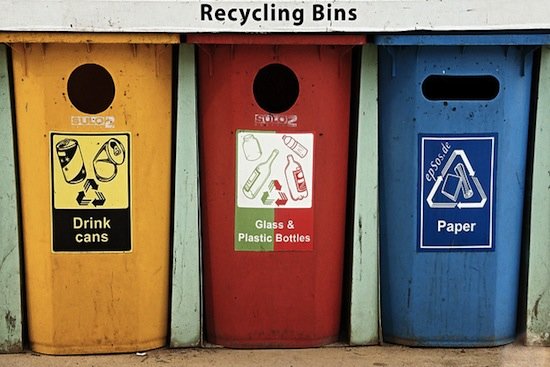An environmentalist’s dream: a shortage of garbage.
The disposal of modern garbage has become a headache for most countries, in particular because of the staggering use of plastic wrappings and plastic containers that has long been spiraling out of control. Just the amount of plastic water bottles used and tossed out on a daily basis shows total lunacy: 60 million plastic water bottles in the US alone, 30 million in Europe, more than 100 million worldwide. Daily! Every second approximately 1,500 bottles end up in landfills and in the ocean… and it takes 700 years before plastic bottles start to decompose, and it can take up to 1,000 years for them to fully decompose.
Steps have been taken to reduce this horrendous waste nightmare. The European Plastics Recycling Industry consists of about 1,000 companies with a total of 30,000 employees. Recycling systems are in place for people to pay an extra few cents when they buy food items in recyclable containers. Programs have been implemented to reduce the amount of plastic bags freely given out for every purchase and consumers are encouraged to bring their own reusable shopping bags; less than a year ago in India, the use of plastic shopping bags in New Delhi has even been outlawed. The ban also covers manufacturing of plastic bags and use of plastic sheets, films or covers for packaging books, magazines or cards.

The U.S.A., who used to export much of their trash to China, are now banned from doing so and as a result are drowning in plastic; more than half of the waste produced by U.S. households ends up in landfills and just how much plastic is among that is everyone’s guess. In South American countries and in Asia most landfills are overflowing – countless scavengers usually live close to such areas and salvage what they can for little money but are exposed to toxins and disease and it is not efficient. Indonesia, the Philippines, Malaysia, China, Japan – all of them are making efforts to recycle but the dire situation is far from being solved. There is just not enough push by the governments and population behind it.
The chilling consequences of the global overflow of plastic garbage can be seen at Midway Island in the North Pacific and the situation is not improving.
But now we hear some good news from Sweden, a country with a population of about 9,5 million people: Alan Pierce writes in the Pachamama Alliance that because of Sweden’s innovative waste-to-energy program and the population’s efficient recycling habits, they ran out of trash! Only 4% of the nation’s waste ends up in landfills and what garbage remains is partly used to power the country.
In addition, says Alan Pierce, “to continue fueling the waste-to-energy factories that provide electricity to a quarter of a million homes and 20 percent of the entire country’s district heating, Sweden is now importing trash from the landfills of other European countries. In fact, those countries are paying Sweden to do so. They are paying to get rid of a source of fuel they themselves produced so that Sweden can continue to have the energy output they need.”
This is so remarkable and ground breaking, one wonders why this important news didn’t go viral immediately. Every country could learn from the Swedish model and implement it suiting their needs. The Pachamama Alliance has made great efforts for a more sustainable future in the Amazon, catalysing sustainable models of energy production and waste management, to empower the indigenous communities; they also conduct educational symposiums all over the globe.
On an individual basis, every little bit of awareness goes a long way – reject plastic bags and wrappings, bring along your own refillable water bottles and make an effort for your waste to be recycled. Ask yourself – do you want to add to this insufferable situation or can you do your bit to leave a less heavy footprint behind?
Related article in Osho News: Converting Plastic into Oil
Further reading on the Pachamama Alliance: www.pachamama.org




Comments are closed.